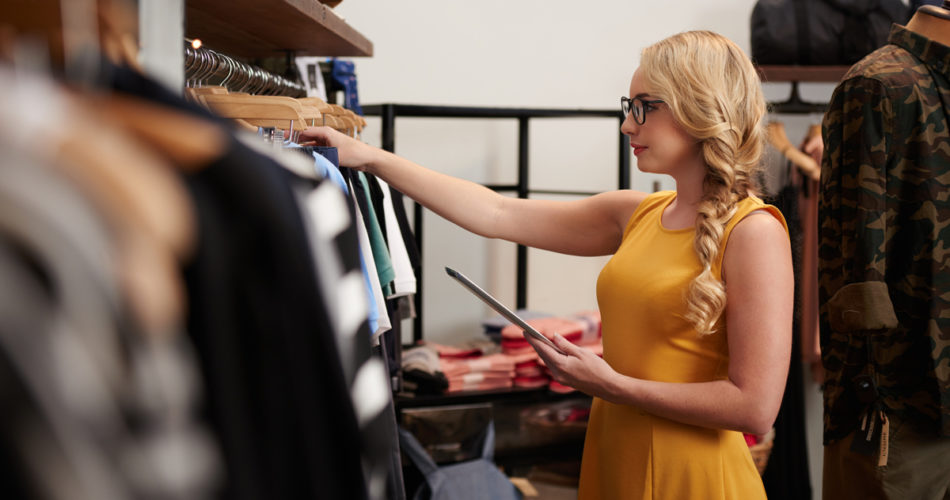Fashion merchandising involves wearing many hats within the fashion industry, sometimes juggling them and sometimes focusing on one area exclusively. The most important functions include product development and production, promoting the merchandise, and buying materials from suppliers. Clothing for both men and women is the most common item that fashion merchandisers work with, but they also create and sell accessories, cosmetics, jewelry, and shoes. People in this role typically work for a retail store or a textile manufacturer.

What Is Fashion Merchandising Exactly?
It’s a dynamic field that requires skilled managers to showcase the latest products and trends to an increasingly fashion-conscious buying public.
Compensation analysis site Payscale.com describes fashion merchandising as the buying, selling and marketing of the fashion industry, as opposed to areas of creation and design. Fashion merchandisers may work within retail operations as purchasing agents who select product lines and create promotions to enhance both brand and market share.
Others work directly for designers and fashion labels placing products in stores, finding shelf space, and managing marketing and promotions. Some get a college degree in fashion merchandising to prepare for opening their own store, which allows complete control over one’s career in fashion.
As a fashion merchandising professional, you’ll combine your love of apparel with a business-oriented mindset to help brands gain exposure and increase revenue. The diverse nature of this fields means that your workplace could be a traditional office, a retail store, a label’s corporate headquarters, a trade show – or all of the above. You could be meeting with designers to discuss upcoming collections one day, then visiting a textile supplier for a quality check the next day. This fascinating area of study allows you to explore any aspect of the fashion industry’s exciting business sector.
Building a Fashion Brand
Fashion merchandising is a critical building block of a brand. Forbes discusses the increasing importance of branding and consumers’ increased expectations of products and services. Brands will need to work hard to differentiate and stand for something meaningful, emotional and important to consumers.
What is fashion merchandising’s role in establishing brand differentiators? Fashion merchandisers are responsible for how a brand is presented to the public – in stores and online. Online is new terrain for the fashion merchandiser. According to the Forbes article, the consumer will use five or more online sources to facilitate one actual purchase decision, reducing reliance on traditional brick-and-mortar retail stores. A solid fashion merchandising degree program explores branding from all these angles.
Shaundreka Hearne came to Southern New Hampshire University’s online bachelor’s in fashion merchandising management program enthusiastic about getting her own idea branded properly and off the ground. Hearne said SNHU gave her the confidence she needed to launch her brand and get noticed. The coursework in business law was most helpful to Hearne, who said, “It alleviated a lot of fear. As a startup, so many things can be confusing and to have the proper knowledge … is comforting.”

The fashion industry is enormous, and there are a great many careers available for talented individuals. One job may suit your temperament and ambitions perfectly, while another may only frustrate your efforts, so finding a specialization where you can thrive is vital. Fashion merchandising is an area where business and fashion meet. Fashion designers want their designs brought to market, and the market (retailers and customers) want the latest in fashion.
Fashion is a competitive industry, but thankfully, many roles fall under the merchandising umbrella. To secure a job or be considered for promotion, you will probably need a certificate, an associate or bachelor’s degree in fashion merchandising or a closely-related field.
But, what does a degree in fashion merchandising teach you? Of course, that would depend on the school, as each school has their own curriculum. Fashion merchandising is a broad industry but all programs offer basic classes that any degree in fashion merchandising will cover, such as fashion marketing, retail marketing and promotion, fashion buying, retail management, textile design and production, history of fashion, and economics of the fashion industry.
There are also a number of skills you will learn while in school. For example, you will learn problem- solving and analytic skills, business, and marketing. You will build your knowledge of buying, selling and promoting, target market, and market trends. Communication skills and forecasting abilities are also vitally important. Learning these skills is only half the battle – you need to learn to utilize our talent and ability to network, to have success in the area of fashion merchandising you desire.
To get started, we have broken down the various career paths you can choose from as a fashion merchandiser, into eight general categories:
The world of Fashion Merchandising is vast; in fact, areas like retailing and store management are just the tip of the iceberg. To get started, we have broken down the various career paths you can choose from as a fashion merchandiser, into these general categories:
Sample Job Titles
- Fashion Buyer
- Stylist
- Beauty/Perfume Executive
- Fashion Marketing.
- Fashion Analyst
- Fashion Publisher
- Product Developer
- Fashion Director
- Sustainability
Sample Career Areas
- Fashion Forecasting
- Fashion Show Production
- Retail / Store Management
- Product Lifecycle Management (PLM)
- Textiles
- Fashion Photography
There are a variety of otherprofessional rolesto choose from within the fashion merchandising field. For individuals with a creative and artsy eye, the obvious choice is becoming a fashion designer. You may decide that running your own fashion business is your passion instead. In high ranking jobs, you may have the opportunity to travel or attend industry events and work with many different clients. If you enjoy a challenge and are willing to constantly go outside your comfort zone, fashion is the ideal environment.
Resource:

